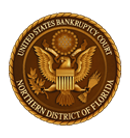ATTORNEYS - ADMISSION TO PRACTICE
- General Admission. Except as provided herein, the District Local Rules, link available online, govern the admission and appearance of attorneys before the Bankruptcy Court.
- Appearing Pro Hac Vice. In order to obtain leave of this Court to appear in a case or an adversary proceeding, the attorney seeking to be admitted pro hac vice must file a motion pursuant to the District Local Rules. Such motion must also comply with any other Bankruptcy Court requirements identified online.
- Admission Not Required in Limited Circumstances. An attorney who is not admitted to the United States District Court for the Northern District of Florida, but is an active member in good standing of the bar of a court of general jurisdiction in any state or territory of the United States, may appear on behalf of a creditor in the following instances:
- Preparation and filing of a notice of appearance and request for service of notices pursuant to Bankruptcy Rule 2002; and
- The preparation and filing of a proof of claim.
- Conduct. All attorneys appearing in the Bankruptcy Court and all persons at counsel table are expected to observe the rules in the District Court’s Local Rules Addendum “CUSTOMARY AND TRADITIONAL CONDUCT AND DECORUM IN THE UNITED STATES DISTRICT COURT,” as interpreted for practice before the Bankruptcy Court.
- Appearance and Withdrawal. The following rules additionally govern appearances and withdrawals from representation in the Bankruptcy Court:
- No attorney, having made an appearance for a creditor in a contested matter or adversary proceeding or having filed a petition on behalf of a debtor, shall abandon the case or proceeding in which the appearance was made or withdraw as counsel for any party, except by leave of Court obtained after giving fourteen (14) days’ notice to the party or client affected and to opposing counsel.
-
- The disclosure statement required by Bankruptcy Rule 2016(b) shall include a statement as to whether the attorney has been retained to represent the debtor in discharge and dischargeability proceedings including those initiated via motion under Bankruptcy Rule 4004.
- If the disclosure statement recites that the attorney has not been retained to represent the debtor in proceedings as described in Subdivision (E)(2)(a) above, the attorney shall not be required to represent the debtor in such proceedings.
- If the disclosure statement fails to recite whether the attorney has been retained to represent the debtor in proceedings as described in Subdivision (E)(2)(a) above, the attorney shall be deemed to represent the debtor in such proceedings and shall not be allowed to withdraw from such proceedings except as provided in Subdivision (E)(1) above.
- Unless allowed to withdraw from a case, matter, or proceeding by order of the Court, counsel filing a petition on behalf of a debtor shall attend all hearings and meetings scheduled in the case or proceeding at which the debtor is required to attend under any provision of the Bankruptcy Code, the Bankruptcy Rules, or order of the Court; provided, however, counsel need not attend a hearing in regard to a matter in which the debtor is not a party and is only required to attend to serve as a witness.
- Any party for whom a general appearance of counsel has been made shall not thereafter take any step or be heard in the case in proper person absent prior leave of Court, nor shall any natural person, having previously elected to proceed in proper person, be permitted to obtain special or intermittent appearances of counsel except upon such conditions as the Court may specify.
- An entity other than a natural person may not file any petition or pleading, except a proof of claim or a ballot, or otherwise appear except through an attorney; provided, however, that any creditor or party in interest may participate in a Section 341 Meeting of Creditors without an attorney.
Advisory Committee Notes
2023 Amendment
The amended rule includes only stylistic changes. The amended rule includes stylistic changes to refer to applicable District Court Local Rules. At the time of this amendment, the Bankruptcy Court has no requirements for admission separate from those of the District Court. The cross-reference to Addendum A has been removed and replaced directly with a citation to the applicable standards of conduct in the District Local Rules. In addition to these rules, other publicly available guidelines and treatises may be instructive as best practices, even if not binding on local practice. Suggested background reading would include the Florida Bar’s Guidelines for Professional Conduct and the most recent version of the Florida Handbook on Civil Discovery Practice, although Florida-specific guidelines may not fully reflect federal law and practice. For example, footnote 53 of the 2021 Florida Handbook on Civil Discovery Practice specifically notes that the particular section of the handbook “is not intended to provide practitioners with a manual for e-discovery in federal court.”
2020 Amendment
The amended rule includes both stylistic and substantive changes. The format of subdivisions is changed to maintain a consistent style across all rules. Subdivision (A) and the note thereto have been amended to more generally incorporate the applicable District Local Rules, including deleting subdivision (A)(1) as duplicative of the district rule, and to separate pro hac vice admission into a new subdivision (B). Previous subdivision (B) is accordingly renumbered as subdivision (C) and includes other non-substantive changes. Previous subdivision (C) is similarly renumbered as subdivision (D) and is simplified to reference Addendum A, which itself incorporates the District Local Rules standards of conduct. All other changes are either stylistic or edits conforming to the subdivision renumbering.
